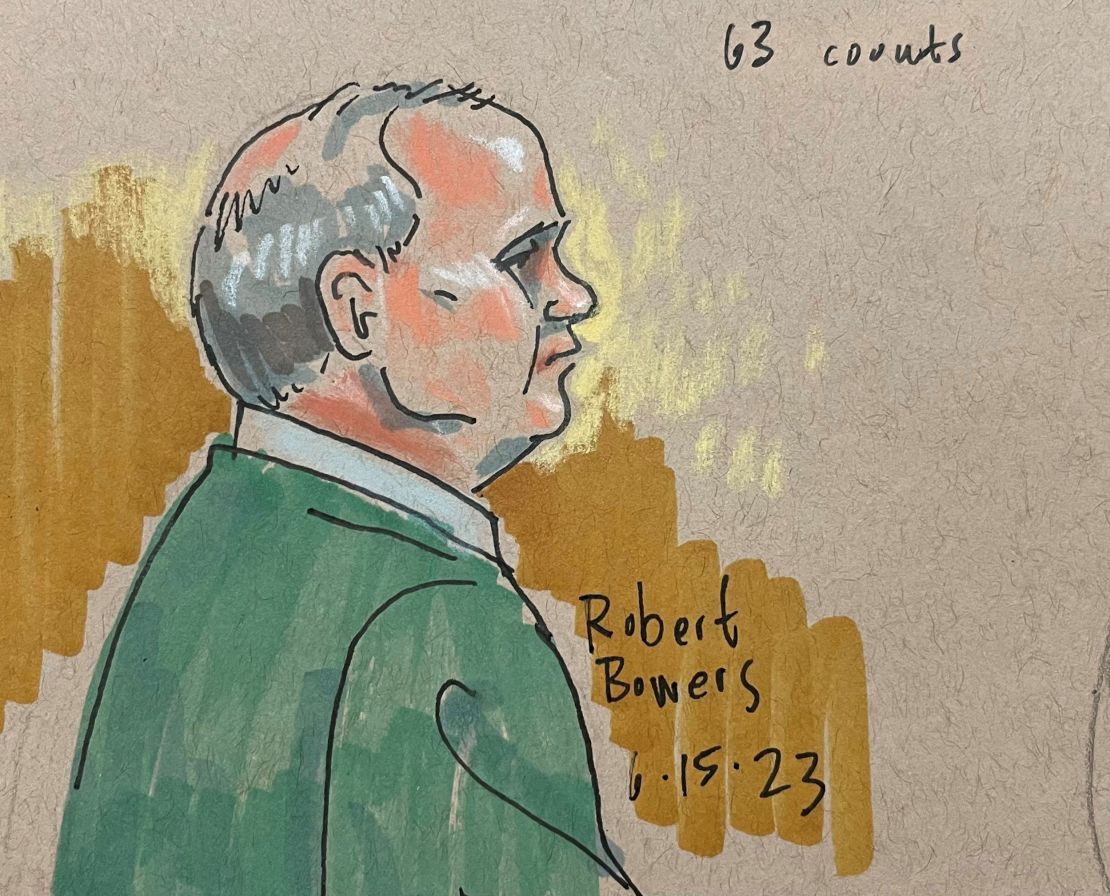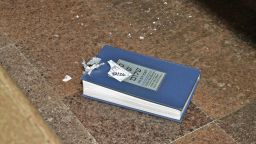Robert Bowers, the gunman who killed 11 worshippers at Pittsburgh’s Tree of Life synagogue in 2018, was convicted by a federal jury Friday on all 63 charges against him.
Bowers, 50, now faces the possibility of the death sentence at the hands of the same jury for the deadliest attack ever on Jewish people in the US.
Wearing a blue collared shirt and navy sweater, Bowers looked at the jury as it entered the courtroom but then turned his attention to papers on the defense table as the verdict was read.

Diane Rosenthal, sister of Cecil and David Rosenthal, bowed her head. She appeared to look down as the counts related to her slain brothers were read.
Asked to individually confirm their verdicts, each juror answered “yes” without hesitation. Some were forceful in their replies. They deliberated for about five hours over two days.
Bowers was convicted of 11 capital counts of obstruction of free exercise of religious beliefs resulting in death and 11 capital counts of use of a firearm to commit murder during and in relation to a crime of violence, among other charges.
Bowers was also convicted of 11 counts of hate crimes resulting in death.
The convictions mean the trial will move to a separate penalty phase, with the jury weighing further evidence to decide whether to sentence him to death or life in prison without the possibility of parole.
The penalty phase is scheduled to begin June 26.
‘Praying, singing and clapping’
“I am grateful to God for getting us to this day,” Rabbi Jeffrey Myers, who survived the mass shooting, said in a statement. “And I am thankful for the law enforcement who ran into danger to rescue me, and the U.S. Attorney who stood up in court to defend my right to pray.”
Myers said his focus is “on being with my congregation and praying, singing and clapping in praise of God as we do each Shabbat.”
“In the face of the horror … our community has experienced, I can think of no better response than practicing my Jewish faith and leading worship,” he added.
The CEO of the Tree of Life Synagogue told CNN’s “The Situation Room with Wolf Blitzer” that her community “feels a sense of relief.”
Carole Zawatsky said people can begin to move forward slowly and heal.
“It’s been a long four and a half years,” Zawatsky told Blitzer.
Jonathan Greenblatt, the head of the Anti-Defamation League, told CNN on Friday it is too soon to tell if the convictions will serve as a deterrent. But it was encouraging the justice system worked, he said.
“It is justice that’s delayed, but it is justice served,” Greenblatt said.
After the verdict, Pennsylvania State Rep. Dan Frankel thanked survivors for their bravery and their testimony.
“They told their stories, they recorded history. Now every one of us must grapple with that story,” he said.
Frankel, who represents the district that is home to Tree of Life synagogue, said he saw the strength of survivors who “recounted the worst days of their lives, the worst minutes of their lives. Worse than anything the rest of us have ever known.”Gov
Pennsylvania Gov. Josh Shapiro said in a tweet the verdict was a step for justice but the pain of the day will never go away.
Bowers’ defense attorneys didn’t speak to reporters as they left the courthouse.
Bowers’ own lawyers admitted he killed the worshippers
The mass shooting also left six wounded, including four police officers who responded to the scene. Eight people who were inside the building escaped unharmed.

The panel returned to the courtroom with a question after deliberating for just over an hour Friday morning, asking the court for instructions on the meaning of “intention to kill” on counts 40 to 47, which involve the six people who were injured in the shooting.
Judge Robert Colville sent a note back to the jury, saying he cannot answer the question and referred them to his initial instructions.
The judge said under the instructions for intent to kill, the definition does not require specific facts. He noted “it remains up to you whether Bowers acted on intent with respect to evidence” presented.
Shortly after resuming deliberations, jurors announced they had reached a verdict in a case in which Bowers’ own lawyers admitted from the start he had attacked and killed the worshippers.
Deliberations began Thursday afternoon and lasted for about five hours after prosecutors and the defense delivered closing arguments.
In closing arguments, Bowers’ defense did not dispute he carried out the massacre. His attorney, Elisa Long, argued he did so because of his hatred for immigrants and the nonprofit Hebrew Immigrant Aid Society but not hatred for Jews.
“Stopping religious study was not his intent or motive,” Long added.
Prosecuting attorney Eric Olshan countered that argument in a rebuttal on Thursday.
“These weren’t people who were engaging in refugee assistance,” Olshan said. “These were people trying to practice their faith.”
On October 27, 2018, Bowers stormed into the Tree of Life synagogue in the Pittsburgh’s Squirrel Hill neighborhood and killed 11 people and wounded six others. The shooting unfolded on a day when the synagogue was hosting three congregations, Tree of Life, Dor Hadash and New Light, for weekly Shabbat services.
In building the case against Bowers, prosecutors called 60 witnesses over more than two weeks to argue he executed the attack because of his hatred for Jewish people, citing a series of antisemitic comments before, during and after the mass shooting, online and in person.
One of those witnesses was Andrea Wedner, who was shot in the arm and survived the shooting by playing dead next to her dying 97-year-old mother. In her emotional testimony, she described the moment she said goodbye to her mother, Rose Mallinger.
“I kissed my fingers, and I touched my fingers to her skin. I cried out, ‘Mommy,’” she said.
Witnesses included survivors of the attack, law enforcement officers who engaged in a shootout with the gunman, and medical, firearms and computer experts.
“The defendant was caught at the synagogue with the murder weapon, so we know he is the shooter,” prosecutor Mary Hahn said in closing arguments. “He outright told SWAT operators he went to the synagogue to kill Jews.”
‘There can be no forgiveness’
New Light Congregation released a statement Thursday saying Bowers was “indiscriminate in his task, shooting both worshippers and police officers.”
“Survivors were forced to relive the day’s trauma; while family members suffered through testimony recalling the final minutes of their loved ones,” the congregation said. “He came to kill Jews.”
“There can be no forgiveness. Forgiveness requires two components: that it is offered by the person who commits the wrong and is accepted by the person who was wronged,” the congregation’s statement reads. “The shooter has not asked – and the dead cannot accept.”
Bowers approached the synagogue with three handguns and an AR-15 rifle, and began firing near the entrance to the synagogue and then opened fire on congregants, according to testimony.
Police eventually shot Bowers multiple times before he surrendered and was arrested.
Those who died included a 97-year-old great-grandmother, an 87-year-old accountant and a couple married at the synagogue more than 60 years earlier.
Before the shooting, Bowers spent years posting about attacks on immigrants and Jewish people on Gab, a small social media platform used by far-right extremists.
He criticized migrants as “invaders” and repeatedly disparaged the Hebrew Immigrant Aid Society, a Maryland charity originally founded a century ago in New York that provides support to refugees all over the world, regardless of religion.
CNN’s Ray Sanchez, Aya Elamroussi, Laura Dolan and Steve Almasy contributed to this report.






